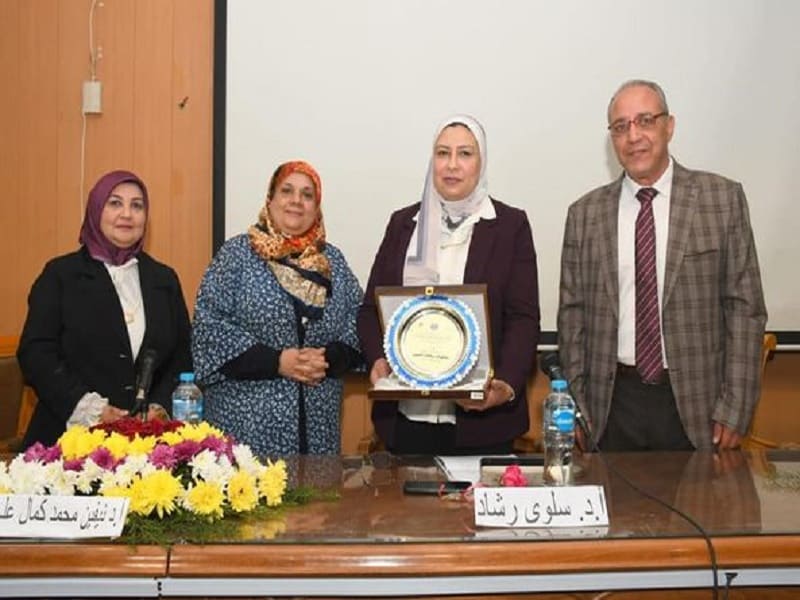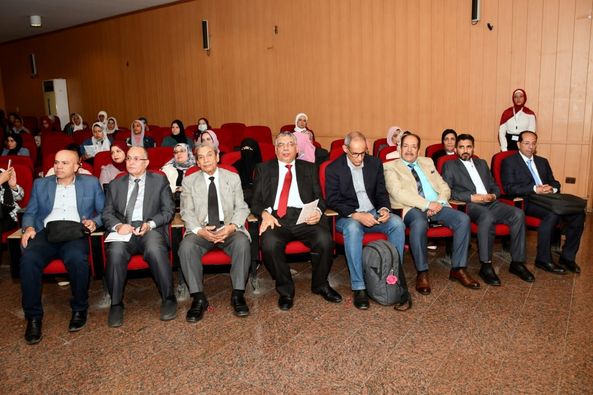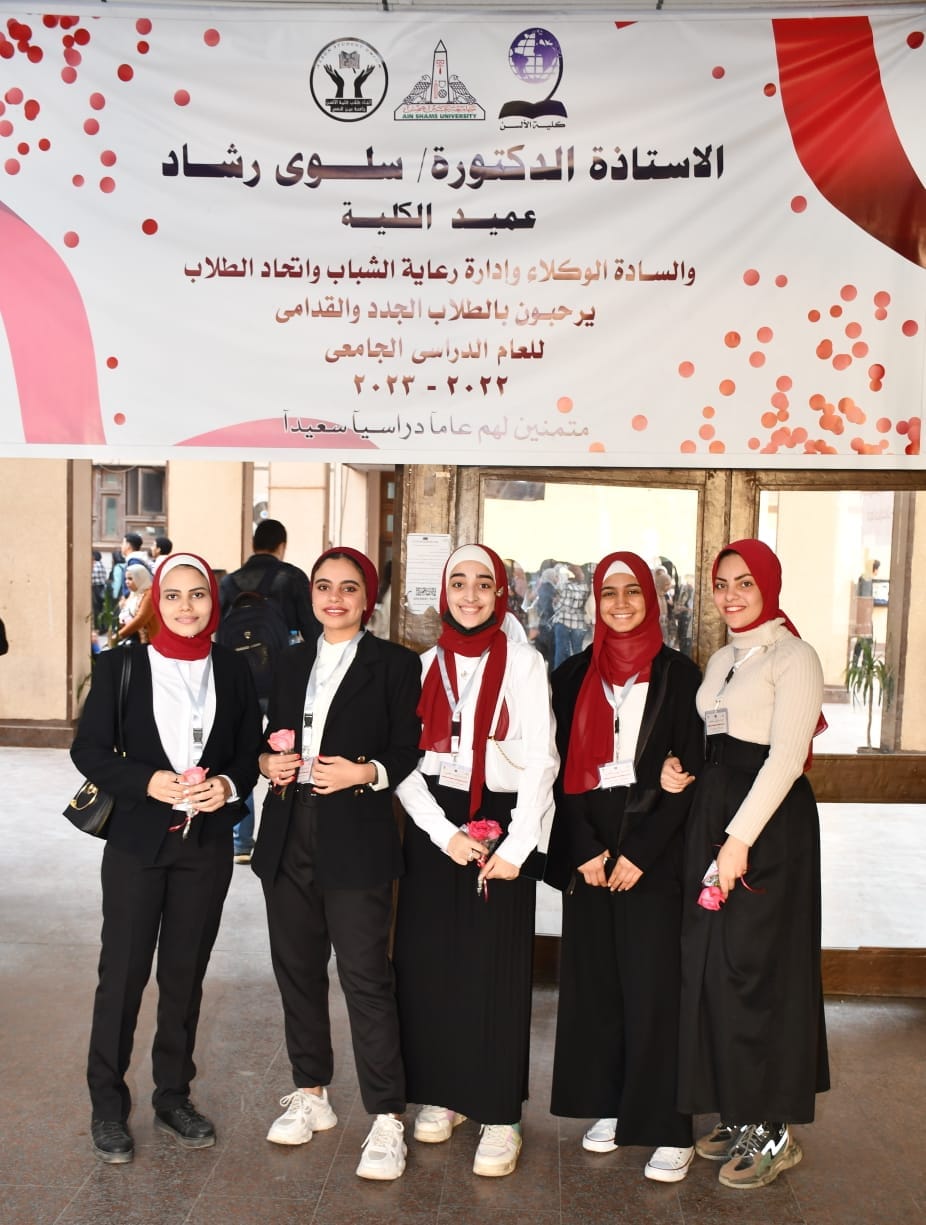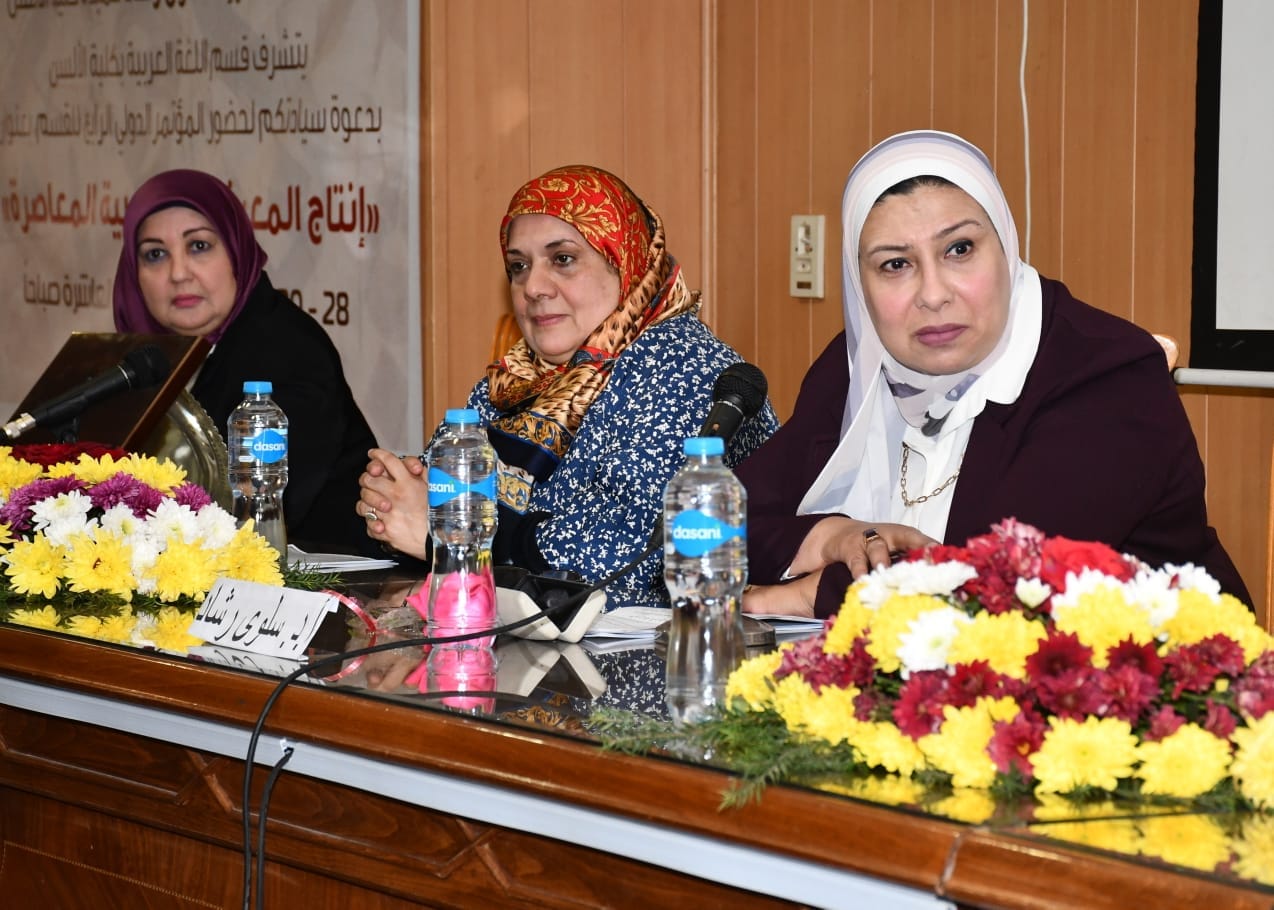
The first cultural salon of the Unit for Combating Violence against Women, entitled Women in Arab and International Literature... in the Faculty of Al-Alsun
The Community Service and Environmental Development Sector at the Faculty of Al-Alsun, Ain Shams University, in cooperation with the Women's Support and Anti-Violence Unit at the university, organized the first cultural salon entitled "Women in Arab and International Literature", under the auspices of Prof. Dr. Mahmoud El-Meteini, President of the University, Prof. Dr. Abdel Fattah Saoud, Vice President for Education and Student Affairs, Prof. Dr. Ghada Farouk, Acting Vice President for Community Service and Environmental Development, Prof. Dr. Salwa Rashad, Dean of the Faculty, and the supervision of Prof. Dr. Yomna Safwat, Vice Dean for Sector Affairs, Prof. Dr. Hind Al-Hilali, Director of the Women's Support and Anti-Violence Unit at the university.
During her inaugural speech, Prof. Dr. Youmna Safwat, Vice Dean for Community Service and Environmental Development, confirmed that the sector is keen to keep abreast of current events on the scene, including the issue of deterring violence against women to ensure the safety of women inside and outside the walls of the university, noting that Ain Shams University is a pioneer in the presence of the unit since 2016, and aims to achieve safety for female students And the workers, pointing to the importance of highlighting the image of women in Arab and international literature, stressing that literature is full of positive examples that indicate that the Arab world has long sensed the importance of women's positive role in building a stable and balanced society capable of advancing development in various fields.
Prof. Dr. Hind Al-Hilali, Director of the Unit, during the introductory symposium, revealed what are the Unit, the unit's objectives, activities, mechanisms, and strategies, and its response to cases of harassment, violence, and bullying, in addition to the services provided by the unit.
 |
 |
 |
||
Prof. Dr. Hind Al-Hilali referred to the role of the university in taking all measures and how to deal with cases that were subjected to violence, bullying, or harassment from the psychological and social side, and how to transfer these cases to the unit to take the necessary legal measures through the Legal Committee and the Psychological Support Committee as well as the Training and Capacity Development Committee and the Social and Entrepreneurship Committee.
During the cultural day activities, Prof. Dr. Hoda Attia, Head of the Criticism Division of the Egyptian Writers Union, says in the Qur’anic texts that Adam was created to descend to the earth whether he ate from the tree or not, and society must restore its view of women in a different way, as it was a logical reason for Adam’s descent to earth and his descent was not a punishment.
And she continued her speech, pointing out that women contribute strongly in various fields, and follow what is said and that they are the origin of the theory of formation, as Eve was created from Adam’s rib at the beginning of creation and the recognized law (me and the other) and the first meaning in life is love, connection or separation, as the idea of Life exists from the ground up and we are all mirrors to the other through which he looks at himself.
Pointing out that the linguistic meaning of women is an Arab experience, and that it is not only a physical existence, but rather a vision of existence for itself, that women are considered the first sacred person in different Arab cultures, where Arab literature embodied women in a distinctive and diverse image, such as mother, daughter, and wife, and explained the description of women in chaste flirtation. How did the Arab woman think, as if the woman and the place were inseparable with the same dignity and sanctity.
It also dealt with the literary view of women, as ancient Arab poets and writers likened women to the moon, as a sign of sustainability. As each circular shape expresses sustainability, she also mentioned the chaste poetry of Arab poets in the pre-Islamic era, when poetry was characterized by chaste spinning, citing the example of al-Qais and Layla. She also explained the strength of women among the Arabs and their role in defending the tribe through Laila's decision not to marry Qais and marry Ward, in order to confirm the unity within the tribe and ensure stability within the tribe by a wise leadership decision from her as a woman.
During her intervention Prof. Dr. Thanaa Al-Kilani, a professor of Arabic at Al-Alsun in Ain Shams, discussed the disguised violence, noting that society often discusses the phenomenon without searching for the reason and that women have been subjected to violence and lack of recognition of their abilities for ages. The origins of this societal unrest are traced back to ancient ideas issued by many philosophers, including Socrates and Plato in the West, and were inherited by modernists and transmitted by Arab societies after being translated from Greek, explaining that these ideas are remnants of ancient legacies and intermittent quotations of religious texts in line with positivist views.
Prof. Dr. Thanaa Al-Kilani dealt with Drama that advocated incitement to violence against women, threatening them, and assaulting them verbally or physically, as well as popular examples that oppressed women in many cases.
As Prof. Dr. Suhair Safwat, Professor of Sociology at the Faculty of Education, states that women are bound by traditions and customs within societies, and dealt with the journey of violence against women within folklore, as masculinity is not a privilege, nor femininity is a deficiency, and women are considered second-class citizens within Arab societies. And Prof. Dr. Suhair Safwat explained that societies revolve around the male sphere in the first place, and the woman comes after the man with care, whether in the capacity of mother, sister, or wife and that proverbs and popular wisdom have a role in consolidating the Egyptian ideas exported to minds about women.
Prof. Dr. Hala Esmat, a professor of French at the Faculty, discussed the motives of violence that women resort to despite its violation of their human instinct, by reviewing the reasons that led the heroine of the novel "The Last Voice" by the Algerian writer Ma Yasai Bey to kill her husband, as the motives of violence go back to the stage of young childhood and youth in which the heroine of the novel suffers from the mother’s domination just because she is a girl, then the events follow to fall prey to the husband’s control, and she ends up killing him without expressing any remorse for her shameful act.
Dr. Tasneem Akram, an Assistant Teacher in the French Language Department, explained the effective, clear, and influential role of women in change through an intervention on "Contemporary French Women between Linguistic Fairness and Qualitative Injustice", where the major advertising companies realized the exceptional ability of women to attract the recipient and convince him mentally and emotionally.
And then she exploited the discourse of the digital influence of women in order to promote products of all kinds. This preference for women over men confirms their extraordinary rhetorical ability in persuasion, which achieves linguistic fairness for them with merit, and also confirms the awareness of others, and men in particular, of these wonderful rhetorical capabilities, while women continue to ignore them and even oppress themselves qualitatively every time they write about themselves and others.
While Dr. Mohamed Yousry, Assistant Teacher at the Department of African Languages and Coordinator of the Women's Support and Anti-Violence Unit at the Faculty, made an intervention in which he discussed the feminist vision of the Kenyan writer Clara Momani through her Swahili novel entitled "Nakuruto".
Through the novel, the writer tried to enhance the role of women in preserving the environment and its resources and reducing pollution resulting from burning waste or dumping it in rivers and oceans. Feminism in Clara Momani took a deeper vision to include the environment to apply the vision of writer Linda Gifred in her book The Feminism of Science: The New Feminism it became as much a philosophy for women as it is a philosophy for the environment.
In conclusion, a workshop was organized on emotional intelligence and how women deal with society. A questionnaire was conducted to show the extent of the woman's acquired emotion while dealing with the situations.
.svg)



